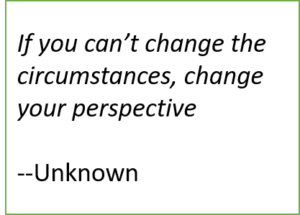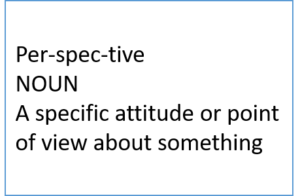Losing Perspective and Getting it Back
 When we’re in the middle of challenging circumstances at work, it is easy to lose perspective.
When we’re in the middle of challenging circumstances at work, it is easy to lose perspective.
Under significant stress, we get tunnel vision. When our adrenal glands activate our flight or fight response, we narrow our focus to better deal with the threat at hand.
That’s great when we’re faced with immediate bodily harm. It’s not helpful when our bodies feel threatened every time we go to work.
When our attention is tightly focused on the stressful problem we’re experiencing, our ability to come up with solutions is reduced. Our brains draw on what we’ve already learned and experienced.
For example, maybe every time your previous manager yelled at you about a project you could calm them down by saying “Yes, I’ll get right to it”. Now your brain might be stuck on finding similar solutions, even if that approach doesn’t work at all with your current boss.
When you’re on high alert at work from constant stress, your natural flight or fight response is probably not going to help you deal with your manager, either. When they berate and demean you in front of your colleagues, you might feel an urge to throw a punch or to run out of the building. If you’re in control of your behavior, you’re most likely to freeze instead.
Many of us have felt stuck in a bad job. When we’re in a toxic workplace for a long time, our narrowed perspective can seem like our only reality. It might seem like there aren’t any good solutions. For every idea, we think of reasons why it won’t work. At times like this our best moments are when we’re distracted from thinking about our jobs.
How do we get perspective back once it’s lost?
The best advice I’ve learned is from the book Good to Great, by Jim Collins. In chapter four, Collins interviewed retired Vice Admiral Jim Stockdale, who survived nearly eight years as a prisoner of war in Vietnam. As he described his survival, Stockdale said, “You must never confuse faith that you will prevail in the end—which you can never afford to lose—with the discipline to confront the most brutal facts of your current reality, whatever they might be.”
Stockdale had an unwavering belief that he would get out of captivity without ignoring the horrific situation he was in. He not only survived, but went on to complete his military career, work in academia, and write a book.
Having faith that you will prevail over your current work circumstances can be challenging when you feel like you’re in survival mode. But think of Stockdale. He was literally in survival mode and prevailed.
Can you believe that you will go on to a better job and leave your miserable one behind? I have talked to over a hundred people who have done this. They were call center employees, pizza deliverers, paralegals, tech workers, correction officers, teachers, government employees, among others.
 In my own career, I once felt trapped in a stressful job where I felt miserable most of the time. I believed that I could quit and find a different job, but I kept thinking of reasons not to. I worried that a new job would have worse benefits, or that I’d have a long commute, or that maybe the good parts of my job should outweigh the bad. I worried about the unknown.
In my own career, I once felt trapped in a stressful job where I felt miserable most of the time. I believed that I could quit and find a different job, but I kept thinking of reasons not to. I worried that a new job would have worse benefits, or that I’d have a long commute, or that maybe the good parts of my job should outweigh the bad. I worried about the unknown.
I had to convince myself to accept “the brutal facts of my current reality”. This meant accepting that there were positive parts of my job that I would miss: a project that I loved working on, many coworkers, and the salary and benefits. I also accepted that the job was wrong for me and I needed to leave it.
It took a long time for me to reach that point, but once I did, my perspective changed in an instant. At the time, I was home sick and didn’t have the energy to do much other than rest. I remember reclining on my couch, staring at the walls of my home, my sanctuary. I suddenly realized that a big reason why I stayed in my job was that it paid the mortgage and other bills.
In that moment, the trap was broken. I knew I could find other work that paid my living expenses, and that staying at my job wasn’t worth the negative impact it had on my wellbeing.
From that moment on, ideas for work came to me without trying. My mind opened to new options, I started writing again, and stopped worrying about paying the mortgage. I was confident in the many positive possibilities that my future could hold.
That was many years and mortgage payments ago. Since then I have been on a whirlwind of adventures in business and writing that I could not have imagined when I was clawing at solutions from inside a small, weary point of view.

Recent Comments